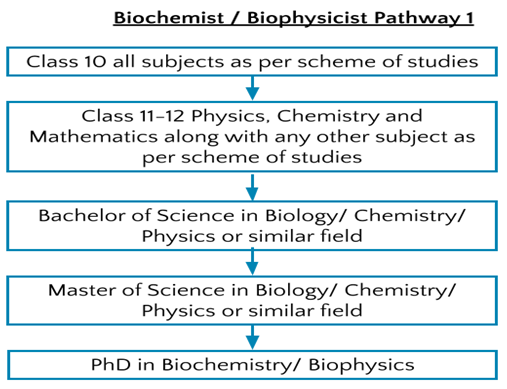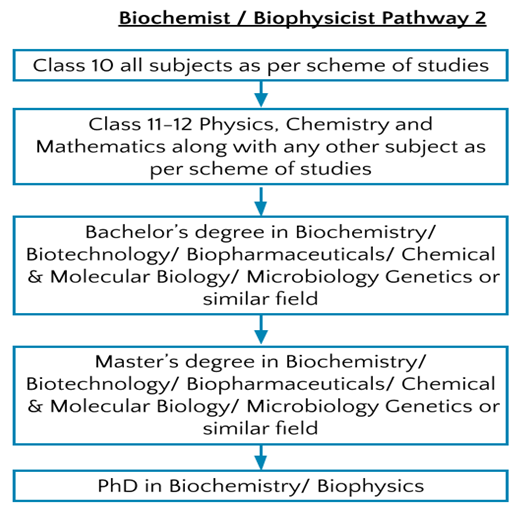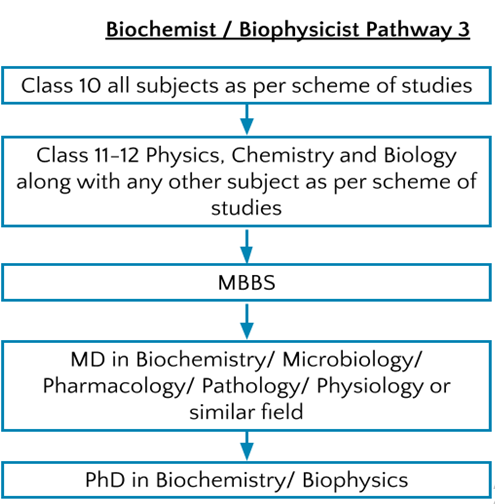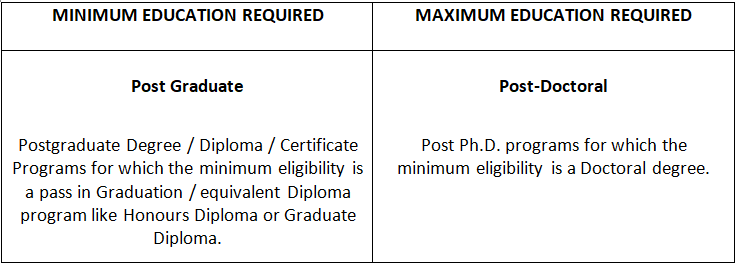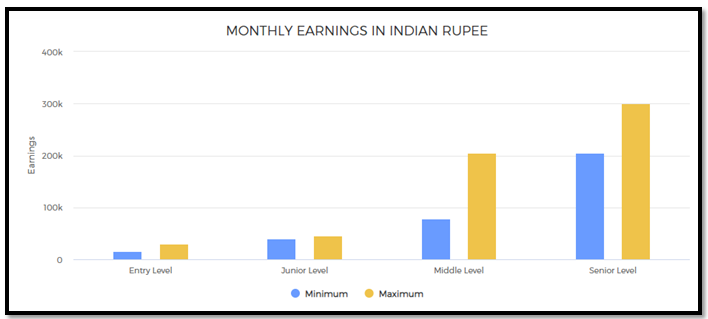Biochemist / Biophysicist
Entry Level Qualification
Graduate
Career Fields
Mathematics & Science
For Specially Abled








About Career
PARTICULARS | DESCRIPTION |
Name | Biochemist / Biophysicist |
Purpose | Study Biological Processes |
Career Field | Mathematics & Science |
Required Entrance Exam | No Entrance Exam |
Average Salary | 200000 - 400000 Rs. Per Year |
Companies For You | Pfizer, Johnson & Johnson, Merck & Many More |
Who is Eligible | Graduate |
Biochemists/ Biophysicists research and study the chemical and physical properties of living organisms at a molecular level.
Biochemists/ Biophysicist try to understand how certain chemical and physical reactions take place in the DNA, proteins and other parts of living cells; how they react to medicines; how they are affected by foods, medicines/drugs, allergens, and other substances.
So what do we mean when we talk about ‘the chemical and physical properties of living organisms at the molecular level’?
As a Biochemist/ Biophysicist you will analyze the structure, components, growth, metabolism, and reproduction of living cells. You will study biological systems such as digestive systems, nervous systems, circulatory system, respiratory system, cardiovascular system, etc. which consist of a complex network of cells, tissues, organs, etc.
As a Biochemist/ Biophysicist, you would develop an in-depth understanding of the structure and functions of macro-molecules such as DNA, RNA, Carbohydrates, Proteins, Lipids, etc. and study their physical properties and biomolecular processes. You will also assist clinical scientists and doctors to understand various patients’ clinical conditions by analyzing their body fluids, tissues, and organs. You will study various biomolecular processes in patients’ bodies and help doctors and other clinicians determine the causes of different diseases and also to monitor the status of the patients’ clinical conditions.
Macromolecules are very large molecules such as proteins and lipids which may consist of thousands of atoms or monomers (monomers are molecules that can react together to form a macromolecule).
Before we move on to understand the key roles and responsibilities, let us understand what exactly Biochemists and Biophysicists exactly do.
As a Biochemist, you would identify and diagnose diseases by analyzing body fluids like blood, urine, saliva, and sweat among many others. You would study and conduct research to look for various proteins, enzymes, vitamins, and then investigate the patterns of test results to understand why a patient is not feeling well. You would study the chemical reactions caused by for example intake of food or other external factors in the body.
As a Biophysicist, you would use fundamentals of physics and mathematics to understand the biological processes. You would be involved in the research and study of how nerve cells communicate, how plant cells transform light into energy, how changes in DNA can be analyzed to identify cancer outgrowths, and so on. Moreover, as a Biophysicist, you would develop methods to cure diseases, produce ways to create energy and renewable sources, understand complex biological structures of the human body and work towards finding their solutions.
Key Roles and Responsibilities
As a Biochemist/ Biophysicist you would be involved in the following key roles and responsibilities:
1. You would be involved in studying to observe the physical and chemical properties of living things such as cell development, breathing and digestion, and living energy changes, such as growth, aging, and death.
2. You would identify and research methods of transferring characteristics, such as resistance to disease, from one organism to another. You would be involved in developing and executing tests to diagnose diseases, genetic disorders, or other abnormalities; tests new drugs and medications used for commercial distribution; and methods to process, store, and use food, drugs, and chemical compounds.
3. You would be involved in using microscopes, lasers and other laboratory instruments and equipment’s to carry out research.
4. You would also be responsible for planning complex research projects, designing relevant experiments and developing studies to improve research and experimentation.
Career Entry Pathway
Class 10 all subjects as per scheme of studies – Class 11-12 Physics, Chemistry and Mathematics along with any other subject as per scheme of studies – Bachelor of Science in Biology/ Chemistry/ Physics or similar field – Master of Science in Biology/ Chemistry/ Physics or similar field – PhD in Biochemistry/ Biophysics
After completing Class 11-12 Physics, Chemistry and Mathematics along with any other subject as per scheme of studies, then you can go for a degree in Bachelor of Science in Biology/ Chemistry/ Physics or similar field. After graduation, you need to pursue a degree in Master of Science in Biology/ Chemistry/ Physics or similar field followed by a PhD in Biochemistry/ Biophysics
Class 10 all subjects as per scheme of studies - Class 11-12 Physics, Chemistry and Mathematics along with any other subject as per scheme of studies – Bachelor’s degree in Biochemistry/ Biotechnology/ Biopharmaceuticals/ Chemical & Molecular Biology/ Microbiology Genetics or similar field - Master’s degree in Biochemistry/ Biotechnology/ Biopharmaceuticals/ Chemical & Molecular Biology/ Microbiology Genetics or similar field – PhD in Biochemistry/ Biophysics
After completing Class 11-12 Physics, Chemistry and Mathematics along with any other subject as per scheme of studies, then you go for a Bachelor’s degree in Biochemistry/ Biotechnology/ Biopharmaceuticals/ Chemical & Molecular Biology/ Microbiology Genetics or similar field. After graduation you need to pursue a master’s degree in Biochemistry/ Biotechnology/ Biopharmaceuticals/ Chemical & Molecular Biology/ Microbiology Genetics or similar field. After masters you must get a PhD in Biochemistry/ Biophysics.
Class 10 all subjects as per scheme of studies – Class 11-12 Physics, Chemistry and Biology along with any other subject as per scheme of studies – MBBS – MD in Biochemistry/ Microbiology/ Pharmacology/ Pathology/ Physiology or similar field – PhD in Biochemistry/ Biophysics
After completing Class 11-12 Physics, Chemistry and Biology along with any other subject as per scheme of studies, you can pursue MBBS. After MBBS you must go for MD in Biochemistry/ Microbiology/ Pharmacology/ Pathology/ Physiology or similar field followed by a PhD in Biochemistry/ Biophysics
Required Qualification & Competencies
As a Biochemist/ Biophysicist, after completing your graduation and post-graduation you would be involved in the following field of studies:
1. Agricultural Biochemistry
2. Animal Biochemistry
3. Biochemistry
4. Biophysics
5. Biopsychology
6. Cellular and Molecular Biology
7. Food Biochemistry
8. Gene-protein Engineering
9. Medical Biochemistry
10. Medical Biophysics
11. Medical Physics
12. Molecular Biology
13. Molecular Biophysics
14. Plant Biochemistry
15. Veterinary Biochemistry
Compentencies Required
Interest
1. Investigative: You should have interests for Investigative Occupations. Investigative occupations involve working with ideas and quite a lot of thinking, often abstract or conceptual thinking. These involve learning about facts and figures; involve use of data analysis, assessment of situations, decision making and problem-solving.
2. Realistic: You should have interests for Realistic Occupations. Realistic occupations involve more practical and hands-on activities than paperwork or office work. Realistic occupations often involve physical activities for getting things done using various tools and equipment.
Knowledge
1. Biological Sciences: Knowledge of plants and animals, their anatomical structure, cell structure, tissues, physiological functions, evolution, and all other related aspects.
2. Chemical Science: Knowledge of the chemical composition, structure, and properties of substances and of the chemical processes and transformations that they undergo. This includes uses of chemicals and their interactions, toxicity, production techniques, and disposal methods.
3. Physical Science: Knowledge of physical principles, laws, their interrelationships, and applications to understand fluid, material, earth, ocean, atmosphere, and space dynamics, as well as mechanical, electrical, atomic and subatomic structures, properties, and processes.
Skills
1. Active Learning: Focused and continuous learning from various sources of information, observation and otherwise for application in getting work done.
2. Coordination: Skills in working together with other people to get things done.
3. Critical Thinking: Skills in analysis of complex situations, using of logic and reasoning to understand the situations and take appropriate actions or make interpretations and inferences.
4. Judgment and Decision Making: Skills in considering the pros and cons of various decision alternatives; considering costs and benefits; taking appropriate and suitable decisions.
5. Problem Solving: Skills in analysis and understanding of problems, evaluating various options to solve the problems and using the best option to solve the problems.
6. Reading Comprehension: Skills in understanding written sentences and paragraphs in work-related documents.
7. Scientific: Skills in using various scientific rules and methods to get things done or solve problems.
Abilities
1. Deductive Reasoning: The ability to apply general rules and common logic to specific problems to produce answers that are logical and make sense. For example, understanding the reasons behind an event or a situation using general rules and common logic
2. Inductive Reasoning: The ability to combine pieces of information from various sources, concepts, and theories to form general rules or conclusions. For example, analyzing various events or situations to come out with a set of rules or conclusions
3. Information Ordering: The ability to arrange things or actions in a certain order or pattern according to a specific rule or set of rules (e.g., patterns of numbers, letters, words, pictures, mathematical operations).
4. Oral Comprehension: The ability to listen to and understand information and ideas presented through spoken words and sentences.
5. Written Comprehension: The ability to read and understand information and ideas presented in writing.
6. Written Expression: The ability to communicate information and ideas in writing so others will understand
Personality
1. You are somewhat organized in your day-to-day life and activities.
2. You are somewhat careful about your actions and behavior.
3. You are imaginative sometimes.
4. You prefer to experience new things and have new experiences sometimes.
5. You act independently sometimes but do not do so in some other times.
6. You are always practical or in most situations.
Career - Job Opportunities & Profiles
As a Biochemist/ Biophysicist you may find job opportunities in:
1. Institutes/ universities conducting research in Biology/Biochemistry/ Biophysics etc. such as National Institute of Immunology, National Centre for Cell Science, National Institute of Plant Genome Research, Institute for Stem Cell Science and Regenerative Medicine, National Institute of Biomedical Genomics, Institute of Genomics and Integrative Biology, etc.
2. Departments, Centres, and Units (Biological Sciences/ chemical sciences/ Physical sciences) under Indian Institute of Sciences such as Department of Biochemistry, Centre for Infectious Disease Research, Molecular Biophysics Unit, Department of Molecular Reproduction, Development and Genetics, Department of Inorganic and Physical Chemistry, Department of Physics, etc.
3. Research institutions such as Tata Institute of Fundamental Research (TIFR), Indian Institute of Chemical Biology, Sanjay Gandhi Post Graduate Institute of Medical Sciences (SGPGIMS), Central Drug Research Institute (CSIR), National Institute of Advanced Industrial Science &Technology (AIST), National Centre for Cell Science, Indian Institute of Science Education and Research, etc.
4. Medical colleges and medical research institutions such as All India Institute of Medical Sciences (AIIMS), Jawaharlal Institute of Postgraduate Medical Education and Research (JIPMER), Indian Council of Medical Research (ICMR), Sri Ramachandra Medical College and Research Institute, etc.
5. Institutions/ universities under CSIR for research in Biochemistry/Biophysicssuch as Centre for Cellular and Molecular Biology (CCMB), Indian Institute of Chemical Biology (IICB), Indian Institute of Integrative Medicine (IIIM), etc.
As a Biochemist/ Biophysicist, you may find the job opportunities as follows:
1. After a Master’s degree, as a (i) Doctoral Fellow (while doing a PhD) or as a (ii) Research Associate
2. After a PhD as a – (i) Post-Doctoral Fellow or as a (ii) Research Scientist/ Scientist
3. In research organizations/companies – Mostly after a PhD as a Scientist or after a Post-Doctoral Fellowship as a Scientist. Some opportunities do exist as a Research Associate after Master’s degree.
4. In university departments and medical colleges, as an Assistant Professor after PhD.
5. In CSIR Indian Institute of Chemical Biology, as Junior Research Fellow (JRF), Senior Research Fellow (SRF) and Project Fellow.
Specialisation Tracks In This Career
Biochemist (Animal)
Animal Biochemists are involved in the research and study of the metabolism as well as the function of animals. Their study focuses on the molecular, biochemical and genetic processes taking place in the animals.
Biochemist (Plant)
Plant Biochemists are involved in the research and study of how plants use food, water, carbon dioxide and sunlight to create oxygen. Their study also focuses on how they are affected by pollutants from air water and soil and how these studies can be used to identify the root causes of certain plant diseases.
Biochemist (Agricultural)
Agricultural Biochemists are involved in the research and study of interactions and relations between herbicides with plants. The study focuses majorly in examining the relationships of compounds, analysing and determining their ability to prevent their growth and development as well as identify the toxicological effect on biological life.
Biochemist (Food/Nutritional)
Food/Nutritional Biochemists are involved in the research and study of how healthy and unhealthy diet impacts the body as well as other components at molecular level. They also study how body derives energy and nutrients from certain food and how these observations can be used in improving the health.
Biochemist (Immunology)
Immunology Biochemists are involved in the research and study of the molecular basis of life and how changes in these could lead to a pathway of diseases. Their study majorly focuses on how the body of a living organism defends itself against dangerous bacteria; how diseases like cancer or tumour could be eliminated or how the body heals itself from wounds.
Biochemist/ Biophysicist (Genetic)
Genetic Biochemists/Biophysicists are involved in the study of the biochemical principles of the genome structure, function of genes and their evolution in order to understand how organisms inherit and evolve.
Biophysicist (Molecular)
Molecular Biophysicists are involved in the study and research of bio molecular systems and understand how cells, DNA, RNA, and proteins interact with each other and how these interactions are monitored.
Biophysicist (Radiation)
Radiation Biophysicists are involved in the research and study of how alpha, beta, gamma, x-ray, ultra violet light and other radiations affect the biological systems. The study focuses on the fundamentals of physics of radiation and radioactivity and how interaction takes place within the realms of radiation with living systems.
Biophysicist (Psychology)
Psychological Biophysicists are involved in using the physical mechanisms to study the behaviour, nature and activities of living organisms.
Biophysicist (Mathematical)
Mathematical Biophysicists are involved in using the principles of mathematics and theory of physics to study and research the behaviour and nature of the living organisms.
Biophysicist (Medical)
Medical Biophysicists are involved in using the techniques of physics and experiments to study and research about the medical applications and how they affect and influence the biological processes.
Career Growth
1. After completing master’s you would start working as a Research Associate.
After Research Associate you will grow as Senior Research Associate. There is no scope of growth unless you complete a PhD. In some corporate organizations, you may find roles as Biochemist in which you may progress as Junior Biochemist and then as a Senior Biochemist.
Research Associate – Senior Research Associate
2. After completing masters, you may also join as a Junior Research Fellow and then become a Senior Research Fellow
Junior Research Fellow – Senior Research Fellow
3. If you want to work in the field of scientific research in institutes or universities, you may progress as:
Scientist – Senior Scientist – Principal Scientist–Senior Principal Scientist – Director/ Chief Scientist
4. If you want to work in the field of teaching at university/institutions, you may progress as:
Assistant Professor – Associate Professor – Professor – Dean/ Director
Salary Offered
1. As a Research Associate, (after completing M.Sc. in Biochemistry/Biophysics or similar field) you may get a stipend of around Rs.15, 000 – 30,000 per month.
2. As a Junior Research Fellow (after completing a master’s degree and clearing CSIR-NET, you may get a stipend of around Rs.35, 000 per month.
3. As a Senior Research Fellow (after 1-2 years of experience as a Junior Research Fellow) you may get around Rs. 38,000 per month.
4. As a Post-Doctoral Fellow (after completing Ph.D.) you may get around Rs. 40,000 – 45,000 per month.
According to the 7th CPC,
1. As a Scientist, you will earn around Rs. 56,100 to Rs.85, 000 per month.
2. As a Senior Scientist, you will earn around Rs.78, 800 to Rs.1, 19,532 per month.
3. As a Principal Scientist, you will earn around Rs.1, 23,100 to Rs.1, 81,995 per month.
4. As a Senior Principal Scientist, you will earn around Rs. 2, 05,400 to Rs. 2, 32,758 per month.
5. As a Chief Scientist, you will earn around Rs.2, 50,000 - 3, 00,000 per month.
If you begin your career in teaching and research
1. As an Assistant Professor Grade-II: Rs.57, 700 to Rs.1, 17,200 per month.
2. As an Assistant Professor Grade I: Rs.1, 01,500 to Rs.2, 04,700 per month.
3. As an Associate Professor, you will earn around Rs. 1, 39,600 to Rs.2, 11,300 per month.
4. As a Professor, you will earn around Rs.1, 44,200 to Rs.2, 24,100 per month.
Monthly Earnings In Indian Rupee

Work Activities
1. Analyzing and interpreting data and information: Analysis of data and information to find facts, trends, reasons behind situations, etc.; interpretation of data to aid in decision making.
2. Communicating with co-workers and others: Communicating with people in writing, verbally or otherwise inside your workplace and various other people who have professional relationships with your place of work including vendors, government officials, etc. or with people at large
3. Decision making and problem-solving: Analysis of data and information; evaluation of alternative decisions and results of decisions; taking the right decisions and solving problems.
4. Getting Information and learning: Observing, hearing, reading, using computers, or otherwise obtaining information and learning from it.
5. Providing advices and consultation to others: Giving advices or consultation to others about various issues, conceptual matters, know-hows, scientific matters, products or services.
6. Monitor Processes, Materials, or Surroundings: Monitoring and reviewing information from materials, events, or the environment, to detect or assess problems.
7. Inspecting situations, events, and people: Inspecting situations, events, and people to understand the reasons and causes for the situation or events to happen; inspecting people to understand reasons behind their behavior and actions.
8. Training and teaching: Understanding educational and training needs of others, developing training programs and educational programs, conducting training programs, teaching and instructing others.
9. Working in a team: Working in a team of people; developing team; maintaining professional relationships among team members.
Future Prospects
According to the India Brand Equity Foundation (IBEF), the Healthcare market is estimated to reach US$ 372. The hospital industry in India is expected to increase from Rs.4 trillion in the year 2017 to Rs8.6 trillion by the upcoming at a Compound annual growth rate (CAGR) of 16-17%.
According to the U.S. Bureau of Labor Statistics, employment opportunities for Biochemists/ Biophysicists are expected to grow 6 % by the year 2028. As the aging population is growing rapidly, there is going to be a two-fold increase in the demand for new drugs and procedures to cure and prevent diseases. This means that there would be a need for basic research which would increase the scientific knowledge in order to research and develop biological products and processes to cure diseases and improve the lives of people.
The demand for Biochemists/ Biophysicists would increase in the coming future as there is a need for research in these scientific disciplines to develop new medicines and treatments.
Future Prospects At a Glance


